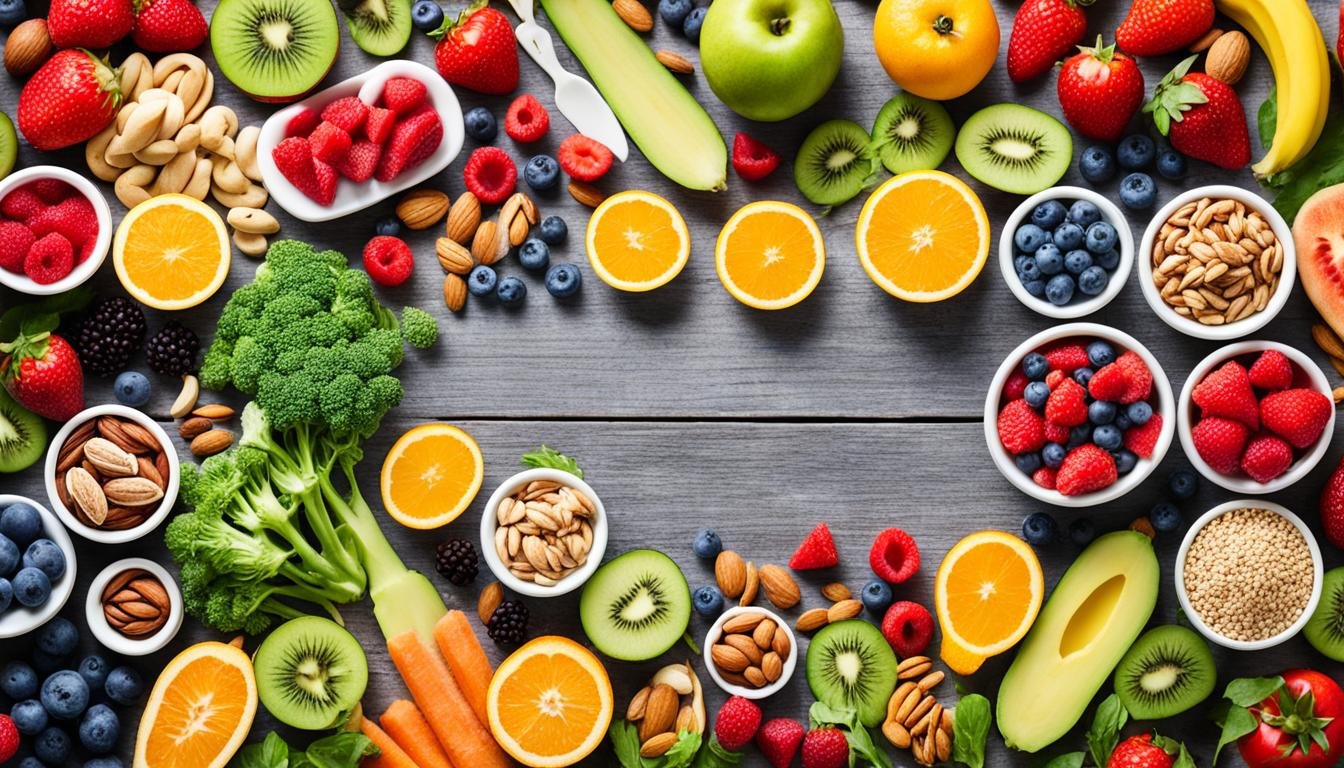Bloating and gassiness can be annoying and uncomfortable, even if you haven’t eaten a lot. Sometimes, it can make your stomach swell. These issues usually aren’t serious health concerns but are linked to your eating habits. By changing how you eat, you can lessen bloating and feel better in your skin.
Eating too much, choosing rich and fatty foods, and rushing through meals can cause bloating. Swallowing air or having trouble digesting certain foods like beans, lentils, and dairy can also make you feel bloated. By watching what you eat and avoiding these foods, you can ease bloating and discomfort.
Key Takeaways
- Overeating, consuming high-fat foods, and eating too quickly can cause bloating and discomfort.
- Swallowing air and consuming difficult-to-digest foods like beans, lentils, and dairy can also lead to gas and bloating.
- Gradually increasing fiber intake and staying hydrated can help relieve bloating.
- Incorporating nutrient-dense fruits, vegetables, and whole grains into your diet may help reduce bloating.
- Mindful eating habits, such as eating slowly and avoiding artificial sweeteners, can also help prevent bloating.
Understanding what causes bloating and adjusting your eating habits can help you avoid discomfort. This article offers strategies to find what works best for you. Take these steps to feel more comfortable in your own skin.
Discover how nutrition can helpyou avoid an unhealthy
Causes of Bloating
Bloating can be a frustrating and uncomfortable experience. Understanding its common causes can help you prevent and manage it. Overeating is a big culprit. Eating more than your body can handle can make you feel full and uncomfortable. The solution is simple – practice portion control and choose smaller servings to ease your digestive system.
Another common cause of bloating is eating high-fat foods. These foods take longer to digest, leaving you feeling stuffed for a long time. To avoid this, try to eat fewer high-fat foods. Instead, focus on leaner proteins, complex carbs, and fiber-rich foods in your eating habits.
Swallowing Air and Gas Production
Eating too quickly can also lead to bloating. It increases the chance of swallowing air, which can cause gas in your digestive system. Slow down and enjoy your meals. This helps your body know when it’s full and avoids overeating. Also, habits like drinking through a straw or chewing gum can make you swallow more air, making bloating worse.
About half of the gas in your system comes from swallowing air, and the other half is made by gut bacteria breaking down food. If your body can’t move this gas out, it can build up and cause bloating and discomfort.
“Listening to your body’s hunger and fullness cues is key to avoiding overeating and the resulting bloating.”
Difficult-to-Digest Foods That May Cause Bloating
Some foods are hard for our bodies to digest, leading to gas and bloating. Knowing which foods might cause these issues can help you manage your digestion better.
Beans, Lentils, and Oligosaccharides
Beans and lentils are full of nutrients but also have sugars called oligosaccharides. These sugars need to be broken down by gut bacteria, which can cause gas and bloating. If beans and lentils make you feel bad, start with small amounts to let your body adjust.
Cruciferous Vegetables and Sugars
Vegetables like broccoli and cauliflower are full of fiber and nutrients but can be hard to digest. They may cause gas and bloating, especially if eaten too much. Adding these veggies slowly and drinking plenty of water can help your body handle them better.
Sweeteners and Lactose
Artificial sweeteners and natural sugars like fructose can be hard for many to digest. Dairy products with lactose can also cause bloating in those who are lactose intolerant. If you think sweeteners or dairy are making you bloated, try eating less or finding lactose-free options.
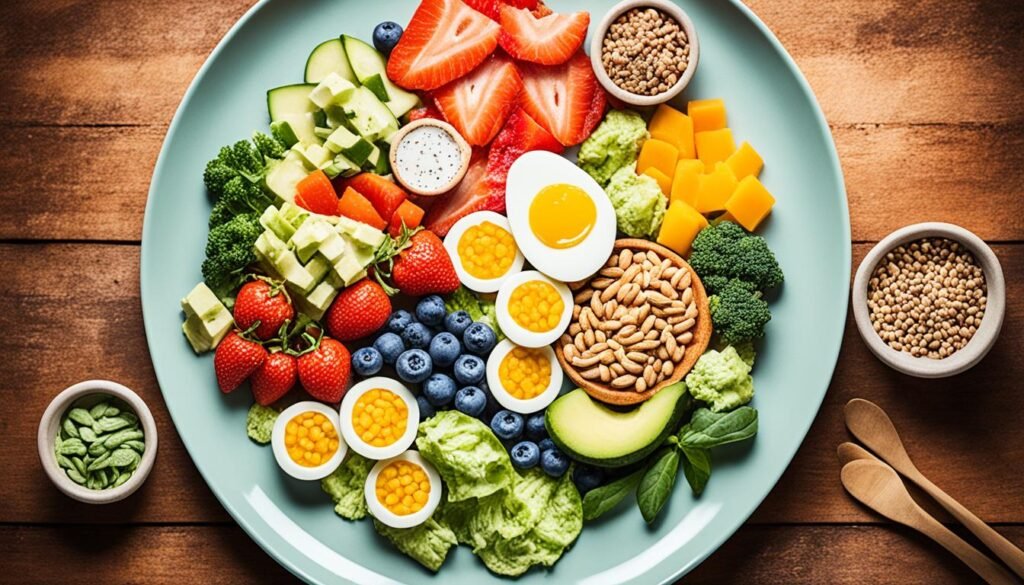
“Paying attention to how your body responds to certain foods can help you identify and avoid the culprits behind your bloating.”
Fiber and Fluid Intake for Bloating Relief
Whole grains are known for their health perks but can sometimes cause bloating and gas. They are packed with fiber intake, which is an indigestible carb. If you suddenly increase your fiber, it might lead to gas, bloating, and constipation. Experts suggest gradually increasing your fiber intake to let your body adjust.
Gradually Increasing Fiber Intake
For bloating relief, slowly add more fiber to your diet. This slow approach lets your digestive system adjust, reducing discomfort. By making gradual changes to your fiber intake, you enjoy its benefits without the bad side effects.
Staying Hydrated with High-Fiber Foods
Drinking enough water is also key when eating high-fiber foods. Joanne L. Slavin, PhD, RD, from the University of Minnesota, says, “All fiber absorbs water.” Being hydrated helps fiber move through your digestive system and prevents bloating and constipation.
By gradually increasing your fiber intake and drinking plenty of water, you can enjoy whole grains and high-fiber foods. This way, you avoid the bad effects of bloating.
Fruits and Vegetables That Help Reduce Bloating
Certain fruits and vegetables can help reduce bloating and support a healthy digestive system. Adding these foods to your diet can ease stomach discomfort and make you feel more comfortable. They are packed with nutrients that are good for your gut.
Citrus Fruits and Berries
Oranges are full of fiber and water, which can stop water retention and help with regular bowel movements. Berries like blueberries and raspberries are also high in fiber, with about 2.1 grams per serving. These fruits can improve digestive health and lessen bloating. Plus, they are loaded with antioxidants that boost gut health.
Vegetables Like Broccoli and Spinach
Broccoli is a fiber-rich vegetable that can help reduce bloating by making your gut healthier. A 2017 study found that mice eating broccoli had fewer digestive problems than those without it. Spinach is also packed with fiber and can increase good bacteria in your gut, like Lactobacillus.
| Food | Fiber Content (per serving) | Potential Benefits for Bloating |
|---|---|---|
| Oranges | 3 grams | Helps prevent water retention and supports regular bowel movements |
| Berries (blueberries, raspberries) | 2.1 grams | Aids in digestive health and may help reduce bloating |
| Broccoli | 2.4 grams | May improve gut health and reduce digestive issues |
| Spinach | 2.2 grams | Increases beneficial gut bacteria like Lactobacillus |
Adding a mix of fiber-rich fruits and vegetables to your diet can help with bloating and improve digestive health. Remember to increase your fiber intake slowly and drink plenty of water for the best results.
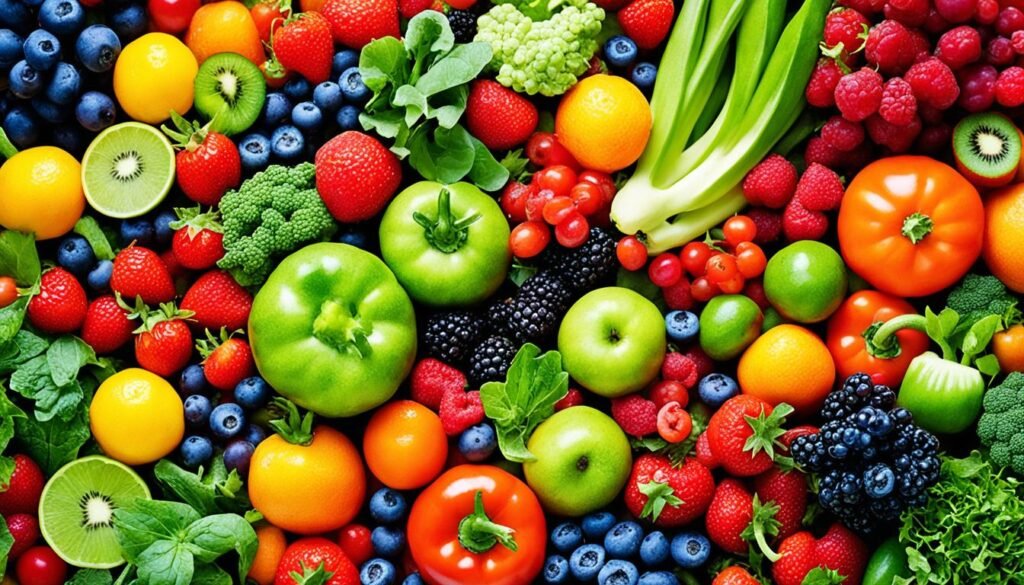
Whole Grains and Fermented Foods for Gut Health
Keeping your gut healthy is key to feeling good overall. Eating whole grains and fermented foods can help your gut microbiome. These foods can make you feel better and more comfortable.
Oats and Beta-Glucan
Oats are a great source of whole grains and fiber. They also have beta-glucan, which can help with colitis, a condition that causes colon inflammation. Adding oats to your meals can support your gut health.
Probiotics in Kefir and Sauerkraut
Foods like kefir, kombucha, and sauerkraut are full of probiotics. These are good bacteria that can improve gut health. Some studies show they can lessen bloating and help with digestion.
Adding whole grains and fermented foods to your diet is easy and tasty. It’s a great way to care for your gut and reduce bloating. Choosing these foods can make you feel better and more confident.
Herbal Teas for Digestive Relief
Herbal teas can help with bloating, cramping, and indigestion. They are natural and effective. Herbal teas are full of antioxidants and healing compounds. They support gut health and offer digestive relief. Ginger tea and peppermint tea are two teas that are great for this.
Ginger Tea
Ginger tea has been a home remedy for stomach issues for centuries. It contains gingerol and shogaol, which help with inflammation and spasms. These can ease bloating, constipation, and nausea. While more studies are needed, many people find ginger tea helpful for their gut health.
Peppermint Tea
Peppermint tea can also help with digestive relief. Its menthol relaxes the digestive muscles. This can ease IBS symptoms like pain, bloating, and diarrhea. Some studies suggest it’s a good addition to managing IBS.
“Herbal teas can be a gentle and natural way to support digestive health and find relief from common gastrointestinal issues.”
If you have occasional or ongoing digestive issues, try ginger and peppermint teas. They are simple and effective ways to support gut health and get digestive relief.
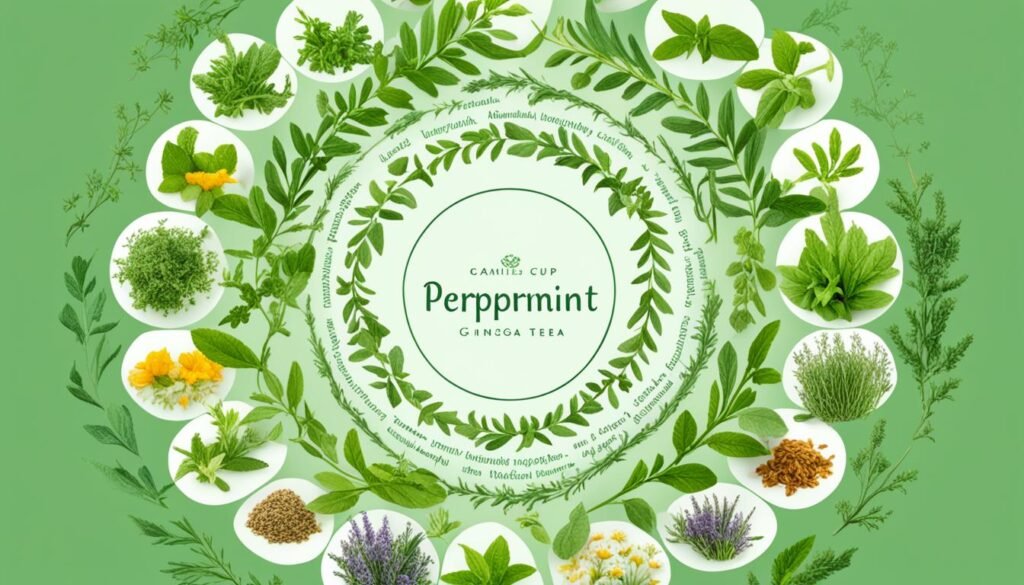
Lifestyle Habits to Avoid Bloating
Healthy habits can help prevent and manage bloating. Being mindful of how you eat and breathe can reduce discomfort. This makes you feel better in your own skin.
Eating Slowly and Avoiding Air Intake
The National Institute of Diabetes and Digestive and Kidney Diseases suggests ways to cut down on air during meals. These include not talking while eating or drinking, eating smaller meals often, and avoiding fizzy drinks and gum. Chewing slowly and eating with attention can stop you from swallowing too much air. This can help reduce bloating.
Limiting Artificial Sweeteners
Staying away from sweeteners like sorbitol and xylitol can also help with bloating. These sweeteners are hard for the body to digest. They can cause gas, bloating, and other stomach issues.
Adding these habits to your daily life can greatly reduce bloating. It can also improve your digestion.
Avoid junk food cravings
Giving in to junk food cravings can ruin your healthy diet. These cravings often come from stress, boredom, or bad feelings. By knowing and dealing with these emotional triggers, you can control your eating and choose better foods.
Emotional Eating Triggers
Some feelings make us turn to unhealthy snacks. Knowing what triggers you, like anxiety or loneliness, helps you find better ways to handle them. You might try stress-reducing activities, hobbies, or talking to friends and family.
Nutrient-Dense Alternatives
Don’t grab junk food when you’re hungry. Choose nutrient-dense foods that fill you up and give you important nutrients. Think about eating more whole foods, such as:
- Fresh fruits and vegetables
- Whole grains like oats and quinoa
- Lean proteins like grilled chicken or tofu
- Healthy fats from nuts, seeds, and avocados
By picking these nutrient-dense foods, you feed your body well. This makes it easier to resist junk food cravings.

“Healthy eating is a way of life, so it’s important to establish routines that are enjoyable and sustainable.”
Medical Conditions and Bloating
For some, bloating and digestive issues might be signs of a deeper health problem. Irritable bowel syndrome (IBS) and gastroparesis are two common causes. If you’ve changed your diet and lifestyle but still feel bloated, seeing a doctor is a good idea.
Irritable Bowel Syndrome (IBS)
IBS is a long-term issue that affects the gut. It brings on belly pain, bloating, constipation, and diarrhea. About 15% of people might have IBS. A doctor can figure out if IBS is causing your bloating and help you find a treatment.
Gastroparesis and Food Intolerances
Gastroparesis slows down stomach emptying, leading to bloating and discomfort. Food intolerances to things like lactose, gluten, or FODMAPs can also cause bloating. A healthcare expert can help manage these issues for relief.
If you’ve tried changing your diet and way of life but bloating persists, get medical help. A doctor can find the cause and create a plan to improve your health.
Over-the-Counter Remedies for Bloating
If you’re dealing with ongoing bloating and diet changes haven’t helped, there are over-the-counter options. Enzymes and simethicone are two common choices. They can ease the discomfort of gas and bloating.
Enzymes for Digestive Support
Look for supplements with the enzyme alpha-D-galactosidase. This enzyme breaks down sugars in foods like beans and veggies that can cause bloating. Taking an enzyme supplement helps you digest these foods better, avoiding discomfort.
Simethicone for Gas Relief
Simethicone is another choice for bloating. It helps break up gas bubbles in your system. Products with simethicone, like anti-gas tablets or liquids, offer fast-acting relief from gas and bloating.
| Over-the-Counter Remedy | How It Works | Benefits |
|---|---|---|
| Enzymes (alpha-D-galactosidase) | Breaks down indigestible sugars | Reduces bloating and gas from difficult-to-digest foods |
| Simethicone | Breaks up gas bubbles in the digestive system | Provides fast-acting relief from excess gas and bloating |
Using over-the-counter remedies like enzymes and simethicone can help with bloating. But, if the issue doesn’t go away, see a healthcare professional. They can find out what’s causing it.
Identifying Persistent Bloating Causes
Occasional bloating is normal, but if it keeps happening, it might mean there’s a health issue. If you’re dealing with persistent bloating, seeing healthcare professionals is key. They can help find out why and give you the right medical evaluation.
Sometimes, bloating comes from eating too much, eating foods high in fat, or swallowing a lot of air. But if it doesn’t go away or gets worse, it could be a sign of something serious. Things like scarring in the stomach can make digestion hard. Persistent bloating or distention may also mean an organ in your belly is getting bigger or there’s another issue.
Consulting with Healthcare Professionals
If you’re having persistent bloating, talk to your healthcare professionals. They can do a full check-up to find out why and help you get better. This might mean exams, tests, or seeing specialists, based on what they think is wrong.
- Be ready to tell them all about your symptoms, like how often and how long you’ve had them, and what makes them better or worse.
- Your doctor might suggest more tests, like scans or procedures through a tube, to check for things like stomach problems or tumors.
- Working with your healthcare professionals can help you figure out why you have persistent bloating. They can also help you find ways to feel better overall.

“Recognizing and addressing the underlying causes of persistent bloating is crucial for maintaining optimal digestive health and overall well-being.”
Mindful Eating and Portion Control
Starting to feel good in your skin begins with mindful eating. Mindful eating means focusing on your food, knowing the difference between hunger and emotional eating, and stopping unhealthy eating habits. It helps you pay attention during meals, stop overeating, and feel better.
Listening to Hunger and Fullness Cues
Key to mindful eating is listening to your body’s hunger and fullness signals. It’s important to know when you’re really hungry, not just eating because you’re bored or stressed. This way, you can make better food choices and avoid bloating.
Pay attention to how your body feels. Stop eating when you’re full, not stuffed.
Strategies for Emotional Eating
Emotional eating, eating to cope with feelings, can lead to bloating. To fight this, find ways to deal with stress or cravings, like mindfulness or other hobbies. This helps you eat better and feel better.
“Mindful eating helps restore attention to mealtimes, prevents overeating, improves self-control, and promotes positive emotions.”
By practicing mindful eating and listening to your body, you can control your food portions and avoid bloating. Dealing with emotional eating also boosts your health and makes you feel good in your skin.
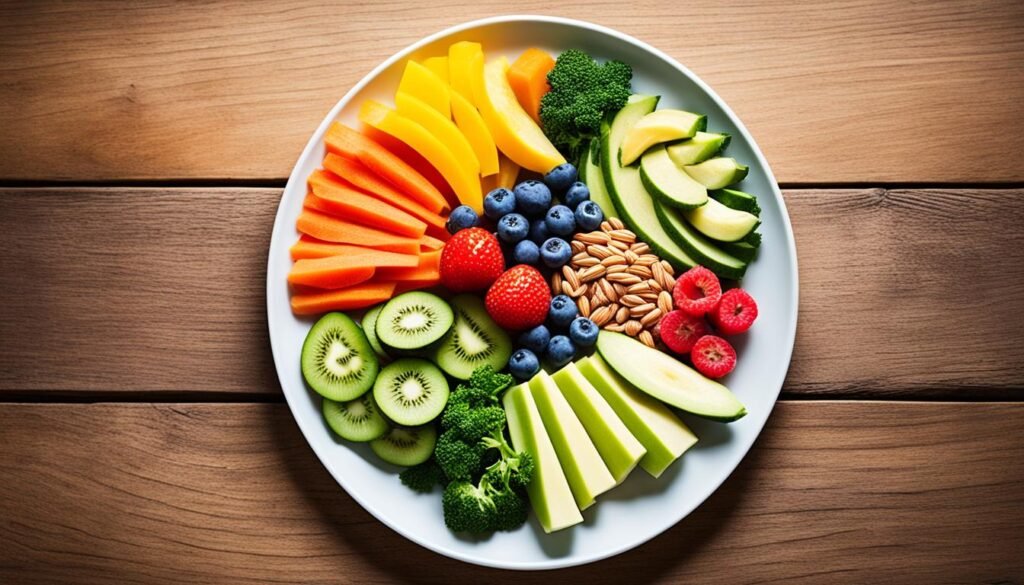
Conclusion
By eating mindfully, you can manage and prevent bloating. Start by slowly adding more fiber to your diet. Also, drink plenty of water and avoid foods that make you feel bloated.
Listen to your body to improve your digestion. This means paying attention to when you feel hungry or full. These habits can greatly improve your digestive health.
Everyone’s digestive system is different. So, try different things to see what helps you the most. If bloating doesn’t go away, talk to a doctor. With patience and the right changes, you can feel better.
Small changes in your eating and lifestyle can help you say goodbye to bloating. Focus on your digestive health for a happier, healthier life. You’ll feel your best if you do.

